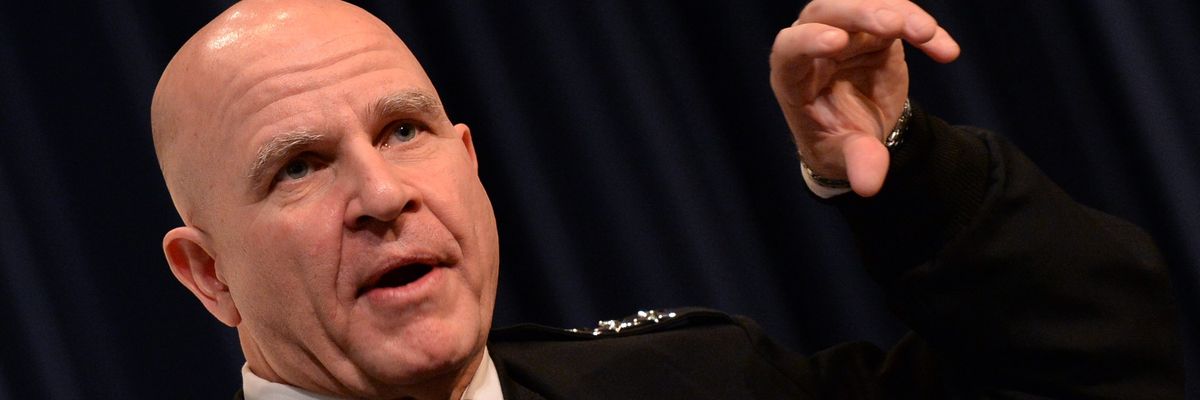When retired Lt. Gen. H.R. McMaster was appointed National Security Advisor by newly-inaugurated President Donald Trump in 2017, hopeful observers called him one of the “adults in the room.”
One of those other “adults” was new Secretary of Defense James Mattis, also a retired general.
Not everyone saw their appointments as a sort of backstop to the inexperienced, clearly mercurial new commander-in-chief. Mark Perry, speaking at The American Conservative’s annual foreign policy conference in 2017, said the generals were “out of their lane,” and not to expect them to steer the Trump foreign policy in any meaningful way. In fact, they may make things worse, Perry said, in that “they might in fact reflect the military in which they’re from, which is expeditionary.”
Three years later it would seem Perry’s contrarian views have been vindicated. Mattis resigned after Trump insisted on pulling U.S. troops out of Syria. Before that, he was instrumental in ensuring Trump’s eventual veto of a congressional invocation of the War Powers Act to end the American role in the Saudi war on Yemen.
McMaster left the administration in 2018 and joined the neconservative Foundation for the Defense of Democracies, chairing their new Center on Military and Political Power. He has made the “threats” posed by Iran (“they have hegemonic designs”) and China (“if they succeed, our country, our world will be less free, less prosperous, less safe”) the center of his tank tank and media circuit schtick.
He has a new book out, “Battlegrounds: The Fight to Defend the Free World,” which is less a tell-all than a “tell you” about his nimble grasp of the geopolitical chess board, offering, as NPR points out, “six tutorials comprising the core of McMaster's knowledge and thoughts about Russia, China, South Asia, the Middle East, Iran and North Korea.” Not surprisingly he gets kid-gloved reviews from the medal-bedazzled mainstream media, with lines like this: “readers should approach this work as a chance to earn several mini-McMaster's degrees.”
But when it comes to Afghanistan, the bullish retired general really loses his cool and shows us not only that his skeptics are right — you can take the man out of the military, but not the military out of the man — but how dangerous his breed of feted former brass is to American interests when it comes to getting our rank and file out of useless, dangerous wars of choice abroad.
At an event at the Alexander Hamilton Society this week, McMaster reportedly “sounded off” about Trump’s support for the ongoing Afghanistan-Taliban talks and efforts to withdraw all American troops from the war after nearly 19 years. He not only called the talks “a travesty” but heartily agreed with his host that it was akin to the Munich appeasement pact in 1938 that was supposed to avert war with Hitler but only hastened the fall of Czechoslovakia and the German invasion of Poland. The “appeasement” charge has been used to chasten and chide leaders and politicians as weak and naive ever since. It was invoked to attack John F. Kennedy for not bombing Cuba during the Cuban Missile Crisis, and used by Lyndon Johnson during the Vietnam War. It was used by Donald Rumsfeld against his Iraq War critics in 2006, and by neoconservatives against John Kerry in his efforts to broker the JCPOA with Iran in 2015.
Put aside for a moment that McMaster hails from a pantheon of post-9/11 brass who are collectively responsible for keeping failing policies alive by insisting to Congress and successive presidents that we were always on "the right azimuth" to victory, or that only by staying the course overseas would Americans be safe at home. It is beyond the pale that McMaster would compare an ill-fated appeasement of the Nazis to a long-awaited, some say way overdue, negotiation between the Taliban and the government of Afghanistan, both of whom are deciding, in essence, the future of their own country.
His “Munich moment” was not made in a vacuum. While his book claims that Trump “has cheapened the sacrifice” of the Americans who died in Afghanistan since 2001, last month McMaster told “60 Minutes” that the president was in effect “partnering with the Taliban against, in many ways, the Afghan government," he said. "I think that it's an unwise policy. And I think what we require in Afghanistan is a sustained commitment to help the Afghan government and help the Afghan security forces continue to bear the brunt of this fight."
It is not so surprising that a former general would prefer the endless war to admitting defeat. Perhaps to him, that is taking the sacrifice of so many for granted. But he is out of touch: a clear majority of recent veterans and their families want out of Afghanistan too. A clear majority don’t even think their fight was worth it. Unlike McMaster, they know it is time to go. Some might think that pushing for a further protracted war in Afghanistan is “cheapening the sacrifice” of military families and base communities that have been in a sort of stasis for nearly a generation — never-ending deployments and all of the attending disruptions, separation, health care costs, uncertainty, and trauma that comes with it.
McMaster is selling a book that in effect is selling a more aggressive posture towards other great powers, with China and Russia in the crosshairs. We need to consider the messenger — this adult in the room — before we take his invectives and appeasement taunts too seriously.
















